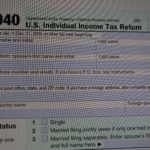Expert: It’s ‘decision time’ for those approaching income tax filing deadline
Writer: Paul Schattenberg, 210-859-5752, [email protected]
Contact: Joyce Cavanagh, 979-845-3859, [email protected]
COLLEGE STATION – Even though this year there a few extra days past the traditional April 15 deadline to file income taxes, many people still will wait until after the deadline to file and need to understand the consequences of filing late, said a Texas A&M AgriLife Extension Service family economics expert.
“According to the IRS, the penalty for filing late is 5 percent of the amount of any additional taxes owed for every month — or portion of the month — the return is late, up to a maximum of 25 percent,” said Joyce Cavanagh, AgriLife Extension specialist in family economics, College Station. “Taxes filed more than 60 days after the due date have a minimum penalty of $135 or 100 percent of the unpaid tax, whichever is smaller.”
Cavanagh said it is best to file all tax returns that are due, regardless of whether or not you can pay in full.

“The IRS can penalize taxpayers for both failing to file a tax return and failing to pay taxes they owe by the deadline,” she said. “Filing on time eliminates any penalty for filing late, but the taxpayer will still be charged a penalty and interest on any tax that isn’t paid. It’s best to file on time and pay as much as possible by April 18, then pay the remainder as quickly as possible to reduce the interest and penalties.”
Additionally, if taxpayers choose to not file a return they risk losing any refund they may have.
“You need to file a return within three years of the return deadline to claim any refund for withholding or estimated taxes,” Cavanagh said. “The same rule applies if you wish to claim tax credits such as the Earned Income Credit.”
The IRS makes it possible for taxpayers to make payments by phone, online or by check or money order. There’s even an IRS2Go app for paying with your mobile device.
She also noted it might be worthwhile to get a loan or pay taxes using a credit card, especially if the fees charged are less than penalties imposed by the IRS.
“You really don’t want to wait for the IRS to send you a bill for your taxes,” Cavanagh said. “The IRS has an Online Payment Agreement tool on its IRS.gov website, where you can make arrangements to pay your taxes over time. You can also file a Form 9465, which is their Installment Agreement Request, along with your tax return. The IRS may let you set up a direct debit agreement where your payment will be automatically debited monthly, so there’s no need to remember to write and send them a check each month.”
Cavanagh said ignoring a tax bill may lead to collection action, which could include wage garnishment or putting a lien on property.
“The IRS will work with taxpayers suffering a financial hardship, so it’s best to contact them to talk about payment options,” she said.
Cavanagh said taxpayers can also request an automatic six-month tax extension by filing IRS Form 4868 and paying any tax due by the original deadline.
“Filing an extension just gives you more time to file; it doesn’t give you any more time to pay,” she said. “Taxpayers will still need to estimate what they owe in taxes and submit payment of any additional tax not paid through withholding or estimated payments along with their Form 4868 to file for an extension. However, if there’s lost or missing documentation or some other issue or complication with your return that may require more time, it might also be worth requesting an extension to make sure your return is accurate.”
She said by requesting an extension in a timely manner and paying at least 90 percent of the taxes owed with the request, it’s likely the taxpayer will not face a failure-to-pay penalty.
“However, you must pay any remaining balance by the extended due date,” she said,
Cavanagh also said taxpayers do not have to pay a late-filing or late-payment penalty if they can show the IRS reasonable cause for not filing or paying on time.
“In instances such as when people are affected by natural or man-made disasters or have had a health crisis or family emergency, the IRS may provide special penalty relief to those who request a time extension to file their federal income tax returns,” she said. “Check with the IRS if you feel you may qualify for special penalty relief.”
Cavanagh said there is also no penalty if the taxpayer files an extension and pays any additional tax owed by April 18, providing a tax return is filed by Oct. 16. There also is no penalty if the taxpayer is owed a refund, provided a return is filed within three years of the April 18 deadline – Oct. 16 if an extension was filed.
“The penalty for late filing applies if you owe taxes and didn’t file your return or extension by April 18,” she said. “It also applies if the taxpayer files an extension and owes taxes, but fails to file a return by Oct. 16.”
Cavanagh noted that since a late-filing penalty can be significantly higher than a late-payment penalty, if taxpayers are unable to pay their tax bill and also didn’t file an extension, they should at least file a tax return as soon as possible.
“That return can be amended at a later time,” she said.


